Protein has become a major focus in the American diet, and for good reason. Research shows that protein is essential for maintaining a healthy immune system, supporting weight management, and improving body composition. It's no wonder many of us are looking for ways to incorporate more healthy proteins into our daily meals.
Protein is undeniably important, but simply eating more of it isn't the only factor to consider. The quantity, timing, and quality of your protein intake are all crucial in maximizing its benefits.
While the Recommended Dietary Allowance (RDA) for protein is 0.8 grams per kilogram of body weight (0.37 grams per pound)—the minimum to prevent deficiency—research suggests this is not the ideal amount for most of us. Many experts believe that a more optimal intake is closer to 1.2-1.4 grams per kilogram body weight (0.6-0.9 grams per pound). Additionally, physically active individuals and older adults often need even more protein to support muscle repair and combat age-related muscle loss.
An easy way to meet your protein needs is to aim for 20-30 grams of protein at each main meal. This amount helps your body effectively digest and absorb the essential amino acids provided by protein-rich foods. While increasing your protein intake is beneficial, focusing on high-quality sources is crucial for reaping the full health benefits. Not all protein sources are created equal—fatty cuts of red meat and processed deli meats, for instance, are associated with a higher risk of heart disease and certain cancers.
The key to a well-balanced diet is choosing good sources of protein that offer maximum nutritional benefits without unhealthy drawbacks. To help you get started, here are 10 of the best healthy protein foods to add to your shopping cart.
10 Best Healthy Proteins
- Eggs
- Fish and Seafood
- Greek Yogurt
- Cow's Milk
- Chicken Breast
- Turkey Breast
- Cottage Cheese
- Beans
- Soyfoods (Edamame, tofu, soymilk)
- Lentils
Eggs
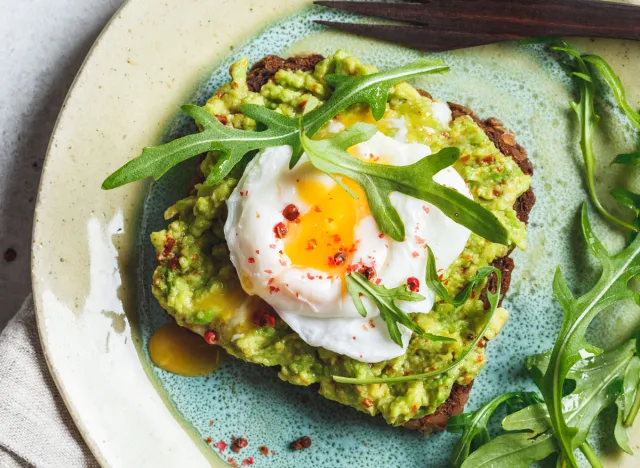
Eggs are often referred to as the gold standard for protein. A study published in the journal Nutrients highlights that egg protein is highly digestible and provides all nine essential amino acids. In fact, eggs boast the highest attainable protein digestibility-corrected amino acid score of any protein source.
Rich in Essential Nutrients
A single large egg contains only 70 calories yet delivers more than 13 essential nutrients. These include iron, vitamin D, zinc, lutein, zeaxanthin, and choline, along with 6 grams of high-quality protein. Eggs are also packed with antioxidants, which help protect your body at a cellular level.
Supports Weight Management
Eating eggs for breakfast may help you maintain a healthy weight. Studies show that eggs reduce hunger and calorie consumption later in the day. In a head-to-head comparison with bagels, participants who ate an egg-based breakfast lost 65% more weight and significantly more belly fat than those who had a calorie-matched bagel breakfast.
Protective Health Benefits
Eggs have also been shown to help protect against infections and provide anti-cancer benefits.
Fish and Seafood

Fish and seafood are two of the healthiest high-quality proteins to include in your diet. Not only does seafood contain all nine essential amino acids for health, but a serving (three ounces) of tuna or shrimp provides about a third of your daily recommended protein intake or 20-25 grams of protein.
Low-Calorie Option
Compared to other protein-rich foods, fish is significantly lower in calories. A standard 3-ounce serving contains only about 100 calories.
Rich in Omega-3 Fatty Acids
Fish is an excellent source of EPA and DHA, the long-chain omega-3 fatty acids known for their heart and brain health benefits. These fatty acids are known to help reduce the risk of cardiovascular diseases and tamp down inflammation along with other health benefits.
Fish is so healthy that the Dietary Guidelines for Americans and the American Heart Association recommend eating at least two to three servings of fish per week (about 6 to 8 ounces cooked) to get the recommended 250 milligrams a day of EPA and DHA.
Greek Yogurt

Europeans have been enjoying Greek yogurt for centuries, but it's become increasingly popular here since Americans have moved away from the sugary, fruit-on-the-bottom type yogurts or candy mix-ins to enjoy a more wholesome, protein-packed yogurt.
Concentrated Source of Protein
Greek yogurt is a good source of protein compared to other standard yogurts because its unique straining process removes liquid whey, creating a thicker, creamier product with twice the protein of traditional varieties. A 6-ounce serving of most brands provides over 15 grams of protein for about 100 calories in nonfat, no-added-sugar options. It's also an excellent source of calcium and contains probiotics that support immune and GI function.
Supports Muscle Growth and Fat Loss
Greek yogurt is a great post-workout treat. A study published in Frontiers in Nutrition found that untrained individuals who included Greek yogurt in their diet during a 12-week training program gained more muscle mass and reduced body fat compared to those who didn't. Participants ate Greek yogurt three times on training days and twice on rest days.
Cow's Milk
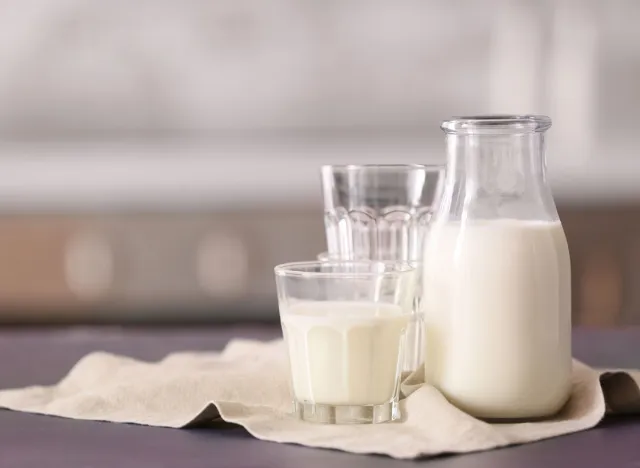
Cow's milk is a great option for those seeking to add beneficial protein to their diet. It provides two types of protein: casein, which makes up about 80%, and whey, which accounts for the remaining 20%. Whey is digested and absorbed quickly while casein is digested more slowly and helps to enhance satiety.
Packed with Nutrients
In addition to its protein content, cow's milk is rich in calcium, vitamin D, B vitamins, and potassium. It also provides about one gram of protein per ounce, so an eight-ounce glass of any type of cow's milk, from skim to full fat, delivers eight grams of high-quality protein. Choosing grass-fed milk adds even more benefits, offering higher levels of conjugated linoleic acid (CLA) and omega-3 fatty acids.
Supports Muscle and Body Composition
Cow's milk has been linked to improved body composition and lean muscle mass. Studies, including one published in Clinical Chemistry, show that milk drinkers tend to have more lean muscle. Athletes often enjoy milk and other dairy foods in their diet to enhance recovery and build and maintain muscle mass.
Chicken Breast
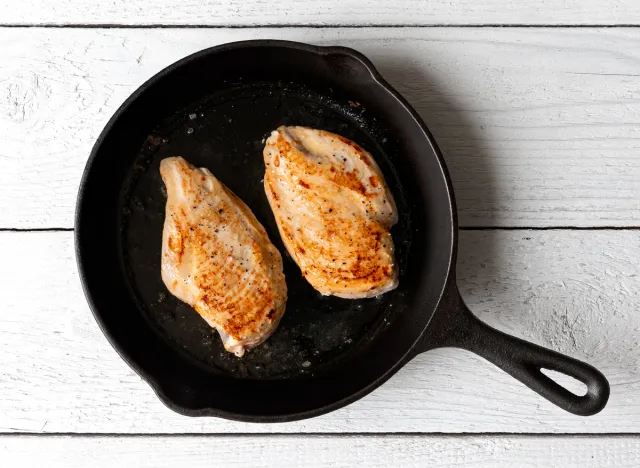
Chicken breast is one of the best sources of lean protein, packing more protein ounce-for-ounce compared to beef. A 3-ounce serving of cooked chicken breast provides approximately 27 grams of protein and just 140 calories, according to the USDA nutrient database. For the leanest option, choose skinless chicken breast, as chicken with the skin on contains twice as much fat.
Rich in Key Nutrients
In addition to protein, chicken breast is a nutrient powerhouse. It's rich in B vitamins, selenium, and phosphorus, and also provides potassium, magnesium, and zinc—making it an excellent choice for overall health and wellness.
Supports Weight Management
The protein in chicken breast has a high satiety effect, helping you feel full and potentially aiding in weight maintenance. A study published in Food and Nutrition Research notes that skinless chicken breast contains just 1% fat, and only a third of it is unhealthful saturated fat Eating chicken breast in lieu of higher-fat animal proteins may also help reduce your risk for cardiovascular disease and type 2 diabetes.
Turkey Breast

Turkey breast is an excellent source of high-quality lean protein. A 4-ounce serving of skinless turkey breast delivers about 27 grams of protein for just 130 calories, making it a nutrient-dense option for those looking to boost their protein intake.
Packed with Essential Nutrients
Like skinless chicken breast, turkey breast is rich in B vitamins, niacin, selenium, and zinc. It's also naturally low in fat, making it a heart-healthy addition to your diet.
Reduced Cancer Risk
For the healthiest choice, skip processed turkey products like deli meat and opt for minimally processed turkey breast that you can roast at home. This allows you to enjoy turkey in its most wholesome form across several meals.
A review article published in the journal Nutrients highlights that red and processed meat consumption may increase the risk of certain cancers, whereas white meats, such as turkey, do not. Incorporating turkey breast into your diet is a safer, nutrient-packed alternative.
Cottage Cheese
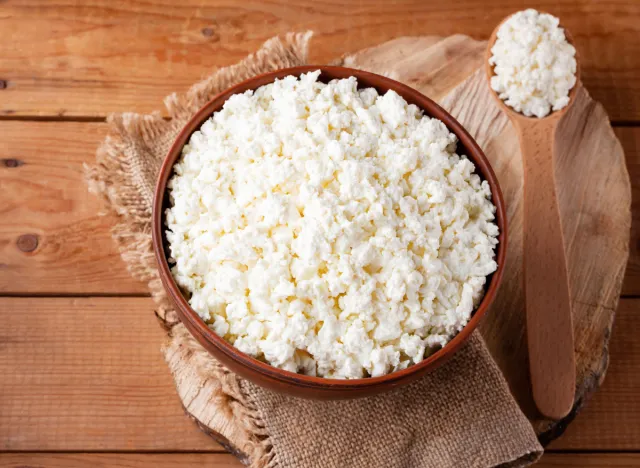
Cottage cheese has the reputation of being the quintessential diet food since the 70s, but it's made a huge comeback in recent years, thanks in part to its stellar nutritional profile that athletes and other health-conscious eaters seek.
Good Protein-to-Calorie Ratio
Low-fat cottage cheese provides more protein per calorie than most other foods. A typical low-fat plain cottage cheese provides around 14 grams of protein and 100 calories in a half-cup serving and it's a good source of calcium.
Promotes Satiety
One study reported in the journal Appetite found that equal calorie snacks of egg or cottage cheese provide similar satiating benefits, helping study participants eat less after snacking on an egg or cottage cheese snack.
Slow-Release Protein Benefits
The protein in cottage cheese is about 80% slow-release casein, making it great to help you stay fuller longer, help moderate blood sugar levels, and help your muscles recover post-exercise.
Beans
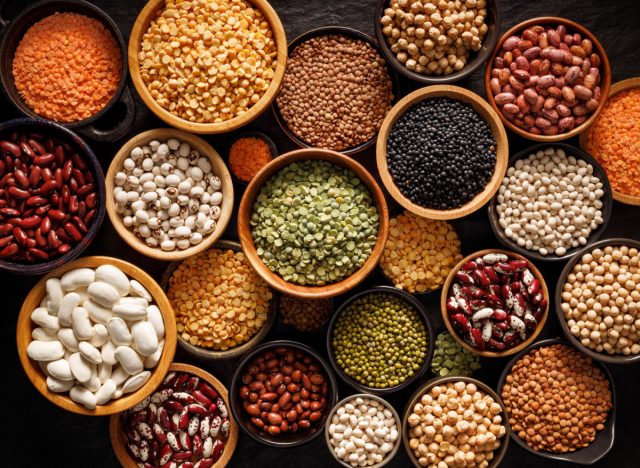
Beans are one of the healthiest plant-based sources of protein, providing about 15 grams of protein per cup. They also deliver a wealth of nutrients, including fiber, antioxidants, zinc, B vitamins, potassium, and magnesium, making them a nutrient-dense choice.
A Filling and Satisfying Food
The combination of protein and fiber in beans makes them particularly filling. This duo helps curb hunger and supports healthy digestion, making beans an excellent addition to a balanced diet.
Heart-Healthy Benefits
Research published in the American Journal of Clinical Nutrition highlights the powerful polyphenols in beans, which help lower harmful LDL cholesterol. Beans have also been shown to reduce the risk of metabolic syndrome, heart disease, and type 2 diabetes.
Recommended by Dietary Guidelines
The Dietary Guidelines for Americans recommend eating three cups of beans and legumes each week, which equals about half a cup per day. Incorporating beans into your diet regularly can significantly boost your overall health.
Soyfoods (Edamame, tofu, soymilk)
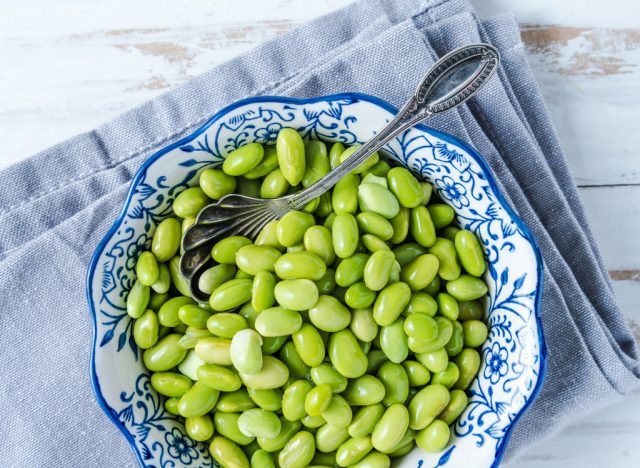
Soy foods are among the best plant-based proteins to add to your diet, especially for those leaning toward plant-based eating. Unlike most plant proteins, soy contains all nine essential amino acids, making it a complete protein.
Packed with Nutrients
A cup of edamame (steamed immature soybeans in pods) provides about 17 grams of protein, 8 grams of fiber, and around 200 calories. Soybeans are an excellent source of fiber and magnesium, and they also provide iron, B vitamins, omega-3 fats, and many other important nutrients.
Heart-Healthy and Low in Saturated Fat
Compared to animal proteins, soy has low amounts of saturated fat, which makes it a heart-smart protein option.
May Reduce Cancer Risk
Soybeans provide isoflavones that studies show help maintain bone health and may protect against certain types of cancer.
Lentils
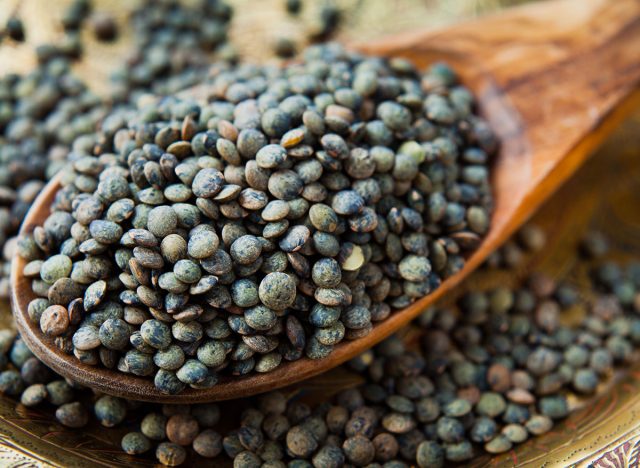
Lentils are protein-rich seeds from the legume family. Available in a variety of colors—brown, red, yellow, black, and more—lentils are a healthy source of plant-based protein regardless of the type you choose. A single cup of cooked lentils provides about 18 grams of protein for 230 calories, comparable to most beans.
Rich in Essential Nutrients
Lentils provide B vitamins, iron, zinc, potassium, and magnesium. They also are rich in antioxidants that can help reduce inflammation and reduce the risk for chronic diseases.
Anti-Inflammatory and Disease-Fighting
According to research published in the International Journal of Molecular Sciences lentils are rich in bioactive compounds that help reduce the risk of diabetes, obesity, cancers, and cardiovascular disease.
No comments:
Post a Comment